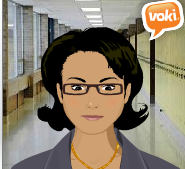I'm finally sitting down to read Disrupting Class (2008, Christensen, Horn & Johsnon) after carrying it around for nine months. I'm on page 25, the book has introduced theories about disruptive innovation, the challenges of creating learning opportunities that are intrinsically motivating to young people, and the difference between student-centric learning technology and monolithic learning technology. Christensen et al. discuss the importance of creating individualized learning and it occurred to me suddenly that I can't remember my sixth grade math teacher's name. Why is that? I started thinking about all my teachers since Kindergarten. I can pretty much name every teacher I've had and what it was about their teaching style that I loved, here are a few...
Kindergarten: Mrs. Hawkins--probably a Montessori type teacher in a public school
1st Grade: Ms. Spina--creative, experiential, small group, individual and whole group instruction
7th Grade Science: Mr. Potter-- kinesthetic, experiential, storytelling, experimental...
9th Grade Social Studies: Mr. Schachter--cooperative learning, student-centered, inquiry based
10th Grade Social Studies: Mr. Stark--storytelling lecture
Each of my teachers had a different teaching style. However, I achieved academically regardless of what my own learning style might have been. I loved the teaching style of each of these teachers, the passion they had for their subject and their individual approach to sharing knowledge. What they all had in common was that they could provide intrinsic and extrinsicly motivated learning opportunities.
So why can't I remember my 6th grade teacher's name and why do I think that is the reason for my interest in online learning? What was different about that class?
I attended four suburban New York public school districts when I was of school age, however, I spent two years in two different school districts in Texas at the end of the big oil boom in the late 1970's. Thank goodness TX was using a module approach for teaching math when I was in 6th grade! Oh how successful I might have been if all my math classes were taught that way.
I was never bored in that particular class, never lost, never frustrated and never dreaded going, so why can't I remember her name?I wonder if the fact that it was the ultimate in a student-centric classroom that I can't remember. Everyday I went to class I had the opportunity to compete with myself. Everyday in class I worked independently to complete a module or two. There was individualized assistance from the teacher if a student needed, there was small group instruction and whole group instruction as needed even though we were all working on different modules.
At that time, in that grade, that was the best way for me to learn that subject! As a ninth grade social studies teacher most of my career, I knew that a module approach to learning would benefit so many of my students and always wondered if we'd (systemically) ever get there here in NY.
So here I am, a doctoral student of ed leadership, with some knowledge of the research and experience in the online learning field wondering if module learning could work for some youngsters, should we make a variety of options to help students achieve academic and personal success available to them? Online learning is essentially learning in modules but with emerging technology it has the potential to provide so much more. Emerging technology may enable us to create high quality customized courses for every student that is truly differentiated to meet their needs.
Sign Up Now for February Professional Learning Sessions
-
An item that may be of interest to readers in Canada, particularly in
Alberta. February 9, 2026 1:00 p.m. – 5:00 p.m. Online Please register by
noon Frida...
3 hours ago

No comments:
Post a Comment